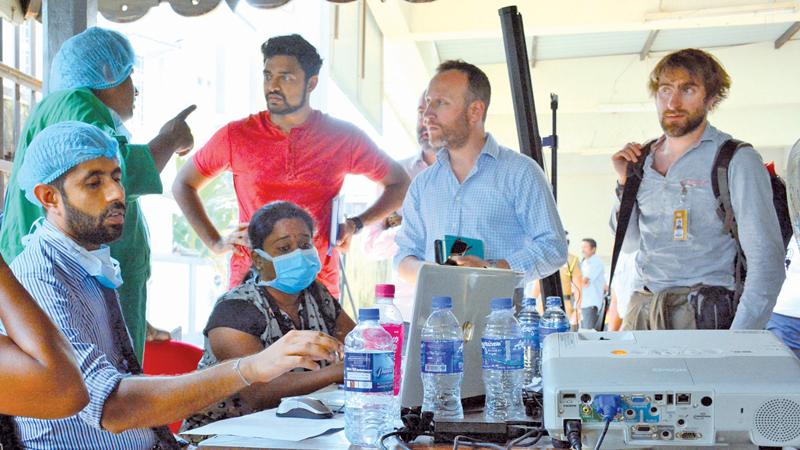
The Colombo Judicial Medical office staff has been offered psychological counselling, to deal with the trauma they experienced in the immediate aftermath of the Easter Sunday’s serial blasts which mostly killed the young and members of families.
 The pain and suffering of relatives unable to come to terms with the sudden departure of their loved ones was overwhelming for even the trained staff of the JMO’s office, Colombo Chief JMO Dr. Ajith Tennakoon said.
The pain and suffering of relatives unable to come to terms with the sudden departure of their loved ones was overwhelming for even the trained staff of the JMO’s office, Colombo Chief JMO Dr. Ajith Tennakoon said.
It was the first time whole families were either affected or wiped out on such a large scale in Sri Lanka’s history after the boxing-day tsunami in 2004.
DNA testing
The office had to deal with parents looking for missing children, children looking for parents, sole surviving members looking for the bodies of their loved ones and relatives whose families had been completely wiped out within seconds. The experience was especially nerve wracking since the blasts happened in places the least expected – Catholic churches and five star hotels- the victims were mostly the church goers.
Dr. Tennakoon said that on Tuesday his staff helped to identify a young boy who died in the attack on St.Anthony’s Church, Kochchikade. The bodies of his parents who also died in the suicide blast were intact and were identified earlier. The boy had been on the missing list until Tuesday, nine days later, when the DNA tests made a positive match.
“We found the boy’s lower limbs and the front part of the head. The parents’ DNA samples collected from their blood were matched with the boy’s. It was highly traumatising to see entire families being affected and especially children being brought in pieces,” Dr.Tennakoon said.
Of the over 250 deaths, the Colombo JMO’s office handled 116 bodies, the boy’s body being the last identified by Wednesday, May 8. According to Colombo Chief JMO, this was possibly the first DNA test done to identify a dead person in Sri Lanka.
The identification of bodies were done by facial expressions and personal belongings and when they were in an unidentifiable state the Judicial Medical Officers depended on special marks like body scars, tattoos, deformities and special teeth positions.
Of the 41 foreign nationals died in the attacks and DNA tests were done on some to identify the remains. However, the bodies of most of the foreigners were not badly damaged.
The bodies of the three children of the Danish billionaire were too identified by DNA testing. Their father, Anders Holch Povlsen flew in Danish Judicial Medical Experts along with the childrens’ DNA profiles to carry out the tests. The reports were confirmed by the Government Medical Analyst after they were referred to him by the Colombo JMO .
Missing persons
Until last Wednesday there were seven missing persons registered at the office. It was feared that these seven missing may be among the body parts yet unidentified.
“We have 50 bags of body parts as of today, but we don’t think there are 50 people in them, the numbers could be less,” the Chief JMO said.
But not all of the incidents at the Colombo Chief JMO’s office were agonising.
The relatives of the seventh person who was missing, a young boy, was greatly relieved and happy last week, when the boy who was believed to be dead was found at the Colombo South Teaching Hospital with only minor injuries.
Only six people who have been reported as missing to the Colombo Chief JMO’s office are still unaccounted for. But it is believed that there are human remains of more than six in the morgue. “There is no way to tell how many, because they are all in fragments,” he said adding the reason why some have not come to claim these bodies is perhaps because no one from their families survived the bombings.
Among the human remains still at the morgue are the blown up bodies of the suicide bombers at Dematagoda and their two children.
With the overwhelming arrival of human remains, starting from Sunday 9.00 am, the Colombo JMO’s office had to call for back up. The Disaster Preparedness Unit of the Health Ministry hired a ‘container cooler’ to temporarily store the bodies till they were released to the next of kin. Releasing the bodies was a long haul process, since many of the bodies were in an unidentifiable state with dis figuration due to burns and shrapnel injury.
The staff worked till 3 a.m. in the morning of the next day (Monday) and returned for duty again at 7.00am after going home for a brief rest. On Monday their work continued till 11 p. m.
From Monday, the relatives of the deceased were given psychological counselling and the registrar of deaths was called in to facilitate the process of issuing death certificates to the victims’ relatives. Four magistrate’s at the JMOs office cleared the legal hurdles.
“At the point of initial identification from the photo images of the face, to the actual identification and receiving of the remains, they were given counselling,” Chief JMO Tennakoon said, adding that his staff has pointed out the need to have counselling for them as well, to relieve the stress and trauma of seeing so much pain and suffering in the immediate aftermath of Easter Sunday’s suicide attacks which claimed more than 250 lives and injured nearly 500.
Pix: Sarath Peiris
